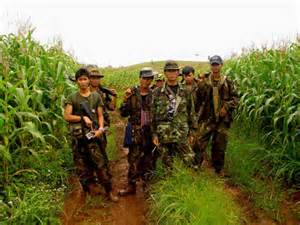Burma Conflict

The ruling military regime in Burma is one of the world’s most oppressive and abusive. Currently, the Burmese government is involved in a military campaign against the largest indigenous ethnic group in Eastern Burma, the Karen. The Karen practice Christianity, whereas Burma is a mostly Buddhist nation. The militarized government has developed plans to eliminate those who do not fit in to what is thought of as being “Burmese.” Many Karen accuse the Burmese government of “ethnic cleansing” due to major counter-insurgency campaigns that have led to widespread mass atrocities against the Karen people. Such atrocities include summary execution, severe torture and rape, as well as forced labor, extortion and displacement. Aid agencies estimate that more than 200,000 Karen have been driven from their homes during the decades of conflict.
Burma, officially the Union of Myanmar, is the second largest country by geographical area in mainland Southeast Asia. The country is bordered by the People’s Republic of China on the northeast, Laos on the east, Thailand on the southeast, Bangladesh on the west, and India on the northwest. As a result of the decades of conflict, more than 2 million Burmese have been forced to seek refuge abroad, particularly in Thailand.
In 1962, Burma’s post-colonial democracy was overthrown in a military coup. Since then, the military has kept tight control over any pro-democracy movements. The military has engaged in a brutal counterinsurgency campaign aimed at denying rebels food, funding, information, and recruits.
In 1988, unrest over political oppression by the government led to widespread pro-democracy demonstrations throughout the country. Security forces arrested thousands of demonstrators, tortured detainees, and further reduced political space for any opposition. In May 1990, the government held the first free elections in almost 30 years. The National League for Democracy (NLD), led by Nobel laureate Aung San Suu Ki, won 392 out of a total of 489 seats. Election results were later annulled by the Burmese government.
In 2008, Cyclone Nargis hit Burma, causing widespread destruction. The Burmese government blocked humanitarian aid to the worst-affected areas for weeks, causing the deaths of countless Burmese civilians.
On November 9, 2010, Burma’s ruling junta stated that they had won the country’s most recent political elections with 80 percent of the votes. This claim is widely disputed by pro-democracy opposition groups which asserted that the military regime engaged in rampant fraud to achieve its result.
Since the 1970’s, the government has increasingly attacked civilians in ethnic minority areas, resettling residents in sites guarded by the military. In its struggle to maintain power, the junta tried to negotiate agreements with all ethnic state armed forces. The Karen state did not give in to the junta; thus, in 1990 the government launched a systematic offensive against the Karen. Reports as recently as February 2010 state that the Burmese government continues to burn Karen villages, displacing thousands. In November 2010, Human Rights Watch reported the Burmese army continues indiscriminate shelling, abusive sweeps, and forced labor in attempts to terrorize civilians.
The Burmese army moves through the region and destroys Karen villages. The Burmese army specifically targets the Karen’s crops and resources in order to starve them out and kill them, without drawing the international community’s attention. Once it gains control of an area, the military uses forced labor to build bases from which the military attack and burn surrounding villages as well as mining the razed areas to discourage returns. Human Rights groups have reported that many Karen are routinely subjected to forced labor, human trafficking, and child labor.
Rape is commonly used as a weapon of war. Government troops are also known to use rape against ethnic minority women as part of a campaign of “Burmanization” through forced pregnancy. Furthermore, recruiting child soldiers has been used as another method of “Burmanization.” The government has designated much of East Burma as a “free fire” zone, meaning that they can act indiscriminately toward the citizens there.
After Cyclone Nargis devastated the country in 2008, the Burmese government redistributed humanitarian assistance to its own people, blocking aid distribution to many of the minority areas that were hit the hardest. Countless numbers of people died as a result. The Karen state was one of the areas denied much-needed aid.
The country’s foreign relations, particularly with Western nations, are severely strained due to the ruling junta’s human rights abuses. The United States and European Union have placed bans on new investment by U.S and E.U. firms, an import ban, and an arms embargo on the country.
Despite Western isolation, Asian countries have remained willing to continue investing in Burma, particularly in natural resource extraction. The country has close relations with neighboring India and China. Burma has received hundreds of millions of dollars in military aid from the two countries.

